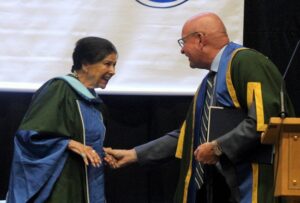Distinguished filmmaker sees brighter future

By PJ Wilson
NORTH BAY – Alanis Obomsawin wants to “praise what is happening” in improving relations to improve the world for Indigenous people.
“We are on the road for betterment for our people. There are good people everywhere in this country. I am tired of always having to talk about the bad stuff.”
The member of the Abenaki Nation and one of Canada’s most distinguished filmmakers, Obomsawin particularly praised an evolving education system in the country, a system she once condemned.
“What we are going toward now is very positive,” Obomsawin said on June 15 after Nipissing University in North Bay, Ont., presented her with an honourary Doctor of Education degree at convocation ceremonies.
Now 90, Obomsawin has seen many changes in the world and especially in Canada in her 56-year career as a filmmaker with the National Film Board (NFB).
“When I started, I didn’t know anything about film-making,” she laughs.
When she started with the NFB in 1976, film-making “was a man’s world. I didn’t realize it would be so difficult. The first 10 to 15 years were very hard. I was an Indigenous person, which made it difficult, and I was a woman, which made it more difficult… It was a very different time. All the rules were different, and I can only thank the NFB for the support it has given me.”
She has two films in the works right now – Wabano: The Light of the Day, and one with the working title of The Green Horse. They will be her 56th and 57th films in a career devoted to chronicling the lives and concerns of First Nations people and exploring issues of importance to everyone.
Obomsawin admits that, early in her career, “I was very anti-education.”
She believed that “it was full of lies and racism” and “damaged everyday life” for people of Indigenous descent.
“I got beat up a lot as a child,” she notes of her time in the school system. “When they opened the history books, I knew I would get beaten up.”
For too long, she says, “the education system was so racist. It was very difficult for so many generations.”
“When we were children, if we spoke our language we were punished for it. We were told it was Satan’s language,” she explains. “Now, these languages are encouraged by the education system. It is working to bring them back. These changes are so big, I am less worried now about our future. The truth is coming out, and there is a lot of respect for our people with encouragement from the government… It is so comforting for the next generations… If there was ever a time for something positive, it is right now.”
In her message to graduates in the Schulich School of Education, she said their roles in the coming years will be “so important” for everyone they encounter.
“When things are hard, what you will have to do is choose. Make sure you choose love. Share your feelings with other people.”
The ceremony was also a chance to revisit Nipissing University, she said. She first came to North Bay to meet with Dr. John Long, who, in 2010, published Treaty No. 9: Making the Agreement to Share the Land in Far Northern Ontario in 1905.
The book, which outlined how the government omitted and misrepresented central elements of the treaty in its conversations with the Mushkegowuk people, inspired Obomsawin’s documentary Trick or Treaty.
Obomsawin’s list of honours is a long one. Her honourary doctorate from Nipissing is the 12th she has received over the years, and the day following that convocation, she was to receive an honourary doctor of Laws from the University of Toronto.
In April, she was honoured with a tribute in the Senate of Canada, and next month, she will receive the Edward MacDowell Medal, recognizing individuals who have made significant cultural contributions. She is the first woman filmmaker to receive this award in its 63-year history.
In 2021, the Toronto International Film Festival presented her with the Jeff Skoll Award in Impact Media, recognizing leadership in creating a union between social impact and cinema, as well as a career retrospective, Celebrating Alanis.
In 2020, she received the Rogers-DOC Luminary Award at the DOC Institute Awards, as well as the Glenn Gould Prize.
Her body of work includes films such as Kanehsatake: 270 Years of Resistance, Incident at Restigouche, Bill Red Remembers, and Jordan River Anderson, The Messenger, which completed a seven-film cycle devoted to the rights of Indigenous children and peoples.


